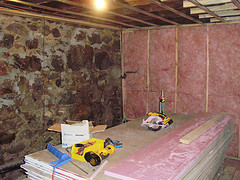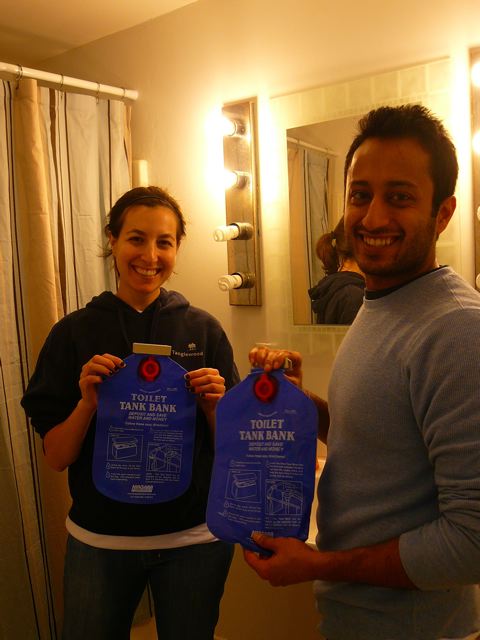The Regional Greenhouse Gas Initiative (RGGI) is the first mandatory, market-based effort in the United States to reduce greenhouse gas emissions. Ten Northeastern and Mid-Atlantic states haved capped and will reduce CO2 emissions from the [electric] power sector 10% by 2018.
States sell nearly all emission allowances through auctions and invest proceeds in consumer benefits: energy efficiency, renewable energy, and other clean energy technologies. RGGI will spur innovation in the clean energy economy and create green jobs in each state.
Category Archives: Cambridge
Energy Savings Seminars Avaialble to MA Communities
 The Massachusetts Municipal Association (MMA) is offering free Home Energy Saving Seminars to communities across Massachusetts. The Massachusetts Municipal Association is a nonprofit, nonpartisan association that provides advocacy, training, publications, research and other services to Massachusetts cities and towns. If you are interested in hosting a workshop in your community schedule the workshop soon, as the program ends in March.
The Massachusetts Municipal Association (MMA) is offering free Home Energy Saving Seminars to communities across Massachusetts. The Massachusetts Municipal Association is a nonprofit, nonpartisan association that provides advocacy, training, publications, research and other services to Massachusetts cities and towns. If you are interested in hosting a workshop in your community schedule the workshop soon, as the program ends in March.
Through this free service offered by MMA, the Cambridge Energy Alliance hosted a Weatherizing Your Home for Ultimate Energy Savings event on January 12th, that brought together over 45 individuals wanting to learn how to reduce their energy use at home. Speaker Clark Goody from the Conservation Services provided detailed information on home energy audits, cost effective investments, and access to resources to help residents save energy and money.
The free energy seminar stresses the importance of reducing heat usage by providing do-it-yourself sealing techniques, tips on hiring a contractor for in-depth alterations, and resources for home audits and financing alterations. Program attendees learned about:
- Air sealing and insulation as the most cost-effective investment for reducing home energy costs
- Programmable thermostats, CFL’s, low-flow showerheads
- Rebates and grants to reduce the cost of home alterations and appliance purchases
- Energy Star ratings as an indicator of product energy efficiency
- MassSave home energy audits, enhanced audits, and the weatherization assistance programs
The Home Energy Savings Seminar is an excellent way for communities to connect residents to efficiency resources and programs. Communities can chose from a variety of workshops including:
___ “Intro to Home Energy Savings” provides simple steps to reducing the use
of electricity, water, and heat; do-it-yourself techniques for basic home sealing
and heating; resources for financing home audits and alterations.
___ “Home Energy Savings for Renters” provides tenant-specific information on
basic home energy savings.
___ “Home Energy Savings for Retirees” provides senior-specific information on
basic home energy savings.
___ “Weatherizing Your Home for Ultimate Savings” stresses the importance
of reducing heat usage by providing do-it-yourself sealing techniques; tips on
hiring a contractor for in-depth alterations; resources for home audits and
financing alterations.
To learn more about the program contact Alicia Hunt at energy@mma.org, 617-426-7272 ext. 280
Green Shelter Project Underway at Transition House
Press Release: Green Shelter Project Underway at Transition House
Cambridge, MA — Transition House, Cambridge’s nonprofit domestic violence prevention agency, is greening its Emergency Shelter. The 120-year-old building buzzed with activity on Sunday, January 10, as Transition House kicked its Green Shelter Project into high gear with a modern-day weatherization barn-raising in partnership with the Home Energy Efficiency Team (HEET), the Cambridge Energy Alliance and New Generation Energy. “We were excited to have so many skilled and enthusiastic volunteers join together to make the Shelter more energy efficient and more comfortable for the 100 people who live there each year,” relayed Risa Mednick, chair of the Transition House Board. “We’re connecting the dots between environmental sustainability, energy conservation and sustaining vital programs in an era when domestic violence is on the rise and the needs of survivors far outstrips available resources.” “Every dollar we save on utility expenses will be redirected toward strengthening services our community depends on,” says Mednick.
Over 40 volunteers worked nonstop in groups led by HEET trainers sealing drafty basement leaks, caulking windows, installing low flow faucets and shower heads, replacing incandescent light bulbs with energy efficient compact florescents (CFLs) and weather stripping doorways. Former Mayor and City Councilor Denise Simmons, Councilor Sam Seidel and Councilor and State Representative Tim Toomey lent a hand. Transition House board members and the Middle East restaurant provided food for hungry workers. HEET donated all supplies and training and the Cambridge Energy Alliance donated CFL bulbs.
“In a few hours, we swapped out 50 light bulbs in 15 rooms, caulked all the windows and doors, fitted sinks with new aerators, and sealed over 140 feet of band joists that were a major source of heat loss,” reported Audrey Schulman, HEET’s president. Based on before and after measurements, HEET estimates a reduction of over $600 per year on heat and electricity bills. “We look for ways an organization like Transition House or an individual in their own home can realize big savings with small changes, says Schulman. One example: simply replacing the old bulbs in exit signs that operate 24/7 with high efficiency LEDs will save Transition House over $100 per year.
Chuck Lewin, founder of New Generation Energy ducked below basement pipes and beams as he sealed up air leaks remarking, “Every small thing each of us did here will have a lasting impact for Transition House. The environmental benefit can multiply if everyone applies what they’ve learned to their own homes and apartments.” HEET trainer Lilah Glick, of the Cambridge Energy Alliance led the team replacing thermostats with instruction in Spanish and English and shared that “programmable thermostats are an inexpensive way to reduce energy consumption, typically saving the average home over $150 dollars a year.”
Introducing low income homeless women to new skills that might spark their interest in green jobs and training opportunities is another important goal of the Green Shelter Project; engaging them in energy saving strategies as a part of budgeting and money management is also key.
Next steps for the organization include: continuing work with HEET to train staff and clients on changing work and lifestyle behaviors to increase energy conservation and savings; collaborating with New Generation Energy and the Cambridge Energy Alliance to monitor utility consumption patterns and assess the efficacy of renewable energy systems for the Emergency Shelter; and a green kitchen renovation.
###
About Transition House: Transition House, a nonprofit organization in Cambridge, MA, works to break the cycle of domestic violence. Transition House offers a continuum of safe, supportive housing options for individuals and families escaping abuse as well as prevention education in school and community settings. Since 1975, Transition House has been a lifeline to thousands of families as they rebuild their lives and has educated tens of thousands of youth in Cambridge and Greater Boston. www.transitionhouse.org
Partners in this green initiative include: the Home Energy Efficiency Team (www.heetma.org), Cambridge Energy Alliance (www.cambridgeenergyalliance.org) and New Generation Energy (www.newgenerationenergy.org) respected organizations with a shared interest in engaging public awareness and increasing participation in conservation and energy efficiency initiatives.
MA gets gubernatorial group’s guidance on retrofits
The National Governors Association announced yesterday that it would be providing support for the development of “policy academies” focusing on building retrofits in six states, including Massachusetts.
A Policy Academy is a highly interactive team-based process for helping a select number of states develop and implement an action plan to address a complex public policy issue. Participating states receive guidance and technical assistance from NGA Center staff and faculty experts and consultants from the private sector, research organizations, academia and the federal government.
Further Complications for Cape Wind
The New York Times published story today on the National Parks Service’s response to an inquiry about Nantucket Sound, finding that is is eligible for listing in the National Register of Historic Places. The site has not yet been listed, and if it were it could further hinder the beleaguered renewable energy development, but it would not be an insurmountable impediment. Continue reading
Stretch Code Passes in Cambridge
 After a series of public hearings, the Cambridge City Council adopted the stretch energy code on December 21st. The stretch code is about 30% more efficient than the baseline building code and has different requirements for both the residential and commercial sectors. Visit the city’s website to learn more about the stretch code, which includes a summary table that outlines the new requirements.
After a series of public hearings, the Cambridge City Council adopted the stretch energy code on December 21st. The stretch code is about 30% more efficient than the baseline building code and has different requirements for both the residential and commercial sectors. Visit the city’s website to learn more about the stretch code, which includes a summary table that outlines the new requirements.
By passing the stretch energy code, the city of Cambridge demonstrates its continued commitment to reduce its carbon footprint, by requiring higher efficiency standards for buildings, which produce 80% of all carbon emissions in the city. In addition, the city of Cambridge has now met one of the requirements of the Green Communities Act, that may provide grant funding for efficiency and renewable energy initiatives.
The stretch code is not without controversy, as expressed in the E2.0 July blog post. The city council weighed in feedback from the community and received recommendations for the code’s adoption from the Climate Protection Action Committee and the city’s Green Building Task Force. The new building code will go into effect on July 1, 2010.
Report from the Cambridge Climate Emergency Congress
 As world leaders gathered in Copenhagen, Our Fair City held its own climate summit inviting townspeople to gather together and brainstorm ideas on how to reduce local greenhouse gas emissions.
As world leaders gathered in Copenhagen, Our Fair City held its own climate summit inviting townspeople to gather together and brainstorm ideas on how to reduce local greenhouse gas emissions.
On December 12, 100 Cantabrigians from a high school student to a climate expert spent the day at City Hall developing proposals that included eliminating all street parking by 2020 and incorporating landscaped or reflective roofs into building codes.
The ideas seemed rather ambitious, but if the city plans to start meeting its greenhouse gas reduction goals it will likely need to get creative. In 2002 city officials launched a plan to reduce greenhouse gas emissions by 20 percent below 1990 levels by 2010. Earlier this year, however, they announced that despite their best efforts emissions have not only not decreased, but, have continued to grow.
City officials will review recommendations from the recent summit and will announce how they plan to proceed on January 23.
The Least Toxic Way to Melt Snow & Ice

We had the season’s first real snowstorm this weekend, and we weren’t really prepared for it. I didn’t even know where our shovel was! We also didn’t have any salt for the front steps, so I took this opportunity to find out if we could get something that had less of an impact on the environment.
From what I can tell, there’s no truly environmentally friendly way to melt snow and ice. The two main materials people use—rock salt and calcium chloride—are both bad; it’s really just a choice of which is better. Along with many others, the City of Cambridge recommends using calcium chloride rather than rock salt or sand. (Ironically, the city also provides rock salt free of charge.) Many de-icers are a combination of multiple ingredients, so check the label. Here’s what I could find in local stores:
Rock Salt – NaCl (Sodium Chloride)
- toxic to plants and animals in high concentrations
- increases salinity of waterways
- corrosive to metal
- works best at temperatures above 20 degrees Fahrenheit
Magnesium Chloride – MgCl
- similar to calcium chloride below, but generally a liquid or additive to other de-icers (often rock salt)
- increases salinity of waterways
- less corrosive than rock salt
Calcium Chloride – CaCl2
- only half as much is needed (a handful per three square yards)
- works better than rock salt at temperatures below 20 degrees Fahrenheit
- increases salinity of waterways
Urea – (NH2)2CO
- adds ammonia to waterways
- increases algae blooms (much like fertilizer)
- works best at temperatures above 20 degrees Fahrenheit
Sand (Or Kitty Litter, Ashes, etc.)
- clogs sewers
- increases sedimentation in streams
- increases turbidity, reducing water quality and potentially killing fish and aquatic plants
- makes hard ice more slippery
- doesn’t melt ice
Calcium magnesium acetate and potassium acetate are two promising de-icers, but they’re generally only available for large-scale use or as additives to rock salt.
Since all ice melters have adverse effects on the environment, the best thing we can do is use less of them. To me, this means that calcium chloride is the way to go. It’s more effective in smaller amounts, and, if I could find the colored kind (I couldn’t around here), I’d be able to see the coverage and use less of it.
Keep in mind that these compounds are not supposed to take the place of shoveling, but break up the ice so we can shovel it away and prevent more skin from forming. That crunch under your feet is an indication that someone used waaay too much.
Cross-posted on pragmaticenvironmentalism.comCandlelight Vigil for Survival
Tonight at First Parish Cambridge, located at 3 Church Street Harvard Square from 5-6.30PM, come out and show your support for climate action and the Copenhagan climate conference. This vigil is part of a weekend of global climate action organized with 350.org and TckTckTck.org.
Candlelight Vigil at Senator Kerry’s Office
 Massachusetts’ citizens will be gathering together tonight in solidarity with the citizens of those nations that will be first to face the impacts of climate change. The candlelight vigil is part of 350.0rg’s call for a science-based international climate treaty and effective U.S. legislation to get us back below 350 ppm of CO2 in the atmosphere.
Massachusetts’ citizens will be gathering together tonight in solidarity with the citizens of those nations that will be first to face the impacts of climate change. The candlelight vigil is part of 350.0rg’s call for a science-based international climate treaty and effective U.S. legislation to get us back below 350 ppm of CO2 in the atmosphere.
The program includes compelling speakers invoking the moral imperative for world leaders to act, a group photo documenting the event, and development of photo messages to President Obama calling for action. People will be meeting at Cardinal Cushing Park in Boston, located at the intersection of Cambridge Street and New Chardon Street (across the street from Senator Kerry’s office at One Bowdoin Square). The vigil is being held from 6:00 – 7:30pm with a post-vigil gathering at the Beantown Pub.
This strategic location is aimed to reach Senator Kerry, who will be America’s principal negotiator at the United Nations Climate Change Conference held this month in Copenhagen. It is not clear what will come out of the negotiations, as there is the potential for developing countries to walk out due to resistance from developed nations providing retribution for past carbon pollution. The US has backed away from taking any action until spring, though the US has established the U.S. Center at the Copenhagen Conference. 350.org has called for vigil’s across the globe, urging for a climate treaty that is line with the latest sciuence and protects the most vulnerable countries to safeguard their very survival.
To rsvp for the climate vigil go to: www.facebook.com/event.php?eid=186121428405&ref=
For more info: email 350Boston@gmail.com



